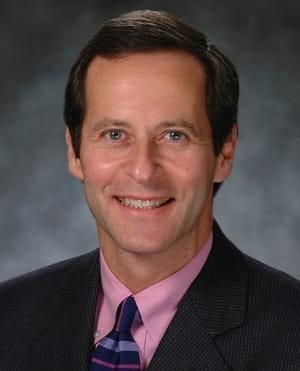Not long after Dr. David Nash arrived at Thomas Jefferson University, news broke of a White House-backed plan to completely overhaul America’s health care system.
It was tabbed “HillaryCare,” as then-First Lady Hillary Clinton took charge of a mammoth proposal that would have provided all Americans with access to health care for the first time. Proponents said the effort was long overdue, not to mention absolutely necessary. Opponents called it wasteful, if not outright socialism.
Ultimately, the plan went nowhere.
Twenty years later, Nash, WG’86, is still at Jefferson, a new President is pushing forward a new universal health care plan, and America is still facing the same old problems—and same confounding questions—about its health care system. In his new role, Nash hopes to help deliver solutions.
Last spring, he was named Founding Dean of the new Jefferson School of Population Health (JSPH), which opened its doors this fall with the aim of training the next generation of leaders in health care policy, public health and healthcare quality and safety. The school offers four masters-level programs and a Ph.D. in Population Health Science, as well as three graduate certificate programs. According to Nash, there’s not another health sciences university like it anywhere.
“Interestingly, our whole school and its strategy for the future is aligned very nicely with where we believe reform efforts must go,” says Nash, a Board Certified Internist who also serves as the school’s Dr. Raymond C. and Doris N. Grandon Professor of Health Policy. “Culturally, medical schools for a century have put these kinds of health-policy issues elsewhere—in schools of public health, in schools of business, but not in the work of doctoring. And I think we are currently paying the price for that attitude.”
Nash certainly has his opinions. He flatly calls the American health care system “broken.”
But if anyone can offer informed criticism of that system, it’s Nash, who brings a wealth of experience and a deep well of health care knowledge to his new position, including time on the medical front lines as a working physician.
After receiving his B.A. in economics from Vassar College, Nash earned his M.D. from the University of Rochester School of Medicine and Dentistry and an MBA in Health Administration from Wharton. He’s published more than 100 articles and edited 19 books, and is the recipient of numerous awards, including the Wharton Health Care Alumni Achievement Award, which he received just this year. He is editor-in-chief of the journals P&T, Population Health Management, Biotechnology Healthcare and the American Journal of Medical Quality.
Having practiced and studied medicine for the past 25 years, Nash says he’s fairly confident that some type of reform will happen. He just doesn’t expect it to happen quickly.
“There’s no future in predicting the future, but if I were a betting man, I would assume there would be a couple themes [in the reform],” Nash says. “First, whatever changes will emerge will be incremental—not revolutionary—and I think we’re going to have to do three things. First, we must insure everybody. We must. We also have to create more value for the dollars we’re spending. And finally, we have to improve quality and improve safety.”
These are the kind of issues that JSPH was created to explore. And the good news, says Nash, is that interest in the school’s programs has exceeded expectations. The bad news, of course, is that the school opened its doors in the midst of the worst economic downturn in decades.
“It’s been an uphill battle,” Nash says.
Still, he’s optimistic.
“We have a couple of things going for us,” he says. “One of those things is the Jefferson brand—and our 20 years of doing work in this area.”
It’s work that wouldn’t have gotten done without Nash.
He arrived at Jefferson in 1990 as director of the school’s Office of Health Policy, a role in which he was charged with keeping Jefferson’s doctors apprised of the latest developments in health care policy—including such issues as HillaryCare. The role proved to be a perfect fit for Nash, who over the course of the next decade grew the office into the one of the first full-fledged Departments of Health Policy at any American medical college.
In turn, it was his success growing that department that eventually led Jefferson’s president to appoint Nash as dean of JSPH. And now that he’s assumed the dean’s chair, Nash says he knows exactly what he’d like to accomplish with the opportunity.
“I’d like to help us become the premier school for training and research in helping to fix our broken system,” he says. “That’s goal No. 1. Second, I’d like us to successfully prepare the leaders of tomorrow. The most important job of a leader is to train tomorrow’s leaders. And nobody [in health care] is going to be doing that the way we’ve organized it.”

























